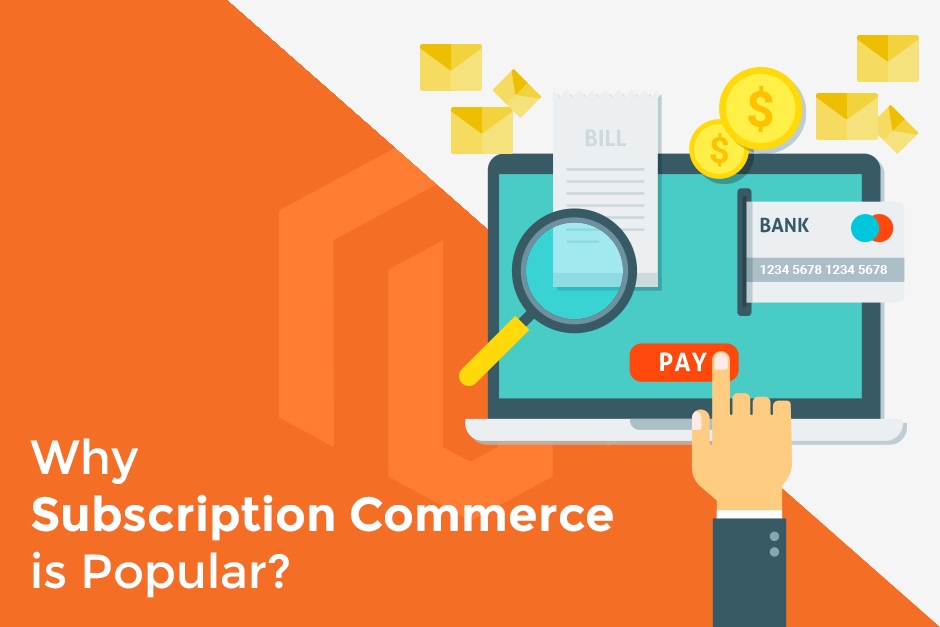With passing years, there is a noticeable change observed in the trends and patterns of the ecommerce industries. Ecommerce is no more confined to developing an ecommerce app and website. It has grown more. Convenience and demands of the consumers are the main factors which have led to the emergence of new concept called Subscription Commerce.
Basic Concept of Subscription Commerce
Well “Subscription” is new for ecommerce industry but it has a strong presence in the traditional format such as subscription of newspaper, magazines, TV channel subscription and many more. With the benefits experienced in it, it has now been introduced on consumer demands for online retail too which may incur many advantages through it.
Advantages of Subscription Commerce for Customers
1) Ease of ordering: Subscription commerce gives convenience to order the products or services instantly. Once you subscribe, you can enjoy the perks of receiving orders every month without ordering or reordering it again and again.
For e.g. Vegetables and groceries is something which need to be ordered on daily basis. Customers can easily subscribe for repeat orders and get them delivered daily without placing the order every day.
2) Timely Delivery: Get your products delivered timely every day, every month or every week without fail.
For e.g. Aged people can get their medicines delivered every month on time without any reminders or calls to the chemists.
Not only from the customer’s perspective, it is advantageous from retailer’s perspective too.
Advantages of Subscription Commerce for Retailers
1) Engage the customers: Post installing your app, its quiet difficult to keep your user engaged. Subscription Ecommerce can be one of the ways to remind them about you every month, week or quarter.
2) Long term relationship with the customer: Subscription business gives retailers the ability to communicate with their customers very often and a strong and long term relationship with them.
3) Affordable retention rate: When your customer subscribe for your products/services, the effort to bring them back is almost null. You do not have to spend on display retargeting, social, email, etc. to bring them back because they will automatically buy from you either every week, month or quarter which means you have lower or almost no retention cost.
4) High margins: You earn higher margins as the cost on the subscribed customer is almost zero and the revenue earned via them is fixed at regular intervals.
5) Stock forecasting: With knowing the orders well in advance, you get a better idea of how much to stock for future orders and there won’t be any wastage. You get the full- fledged order predictability.
6) Brand building: If a customer receives order on recurring basis, your brand becomes the part of their routine life, and further it can help in spreading a word about your brand. They can also promote your products and services indirectly via social media.
7) Consistent monthly revenue: Get a stable revenue graph with fixed monthly, weekly or quarterly revenue.
Apart from the above advantages, one of the biggest advantages is that acquiring a new customer in Subscription ecommerce means you hold a customer for a longer duration, rather than just a one-time purchase.
Recommended Blog: 8 Must Try Marketing Strategies While Launching Your eCommerce Store
Subscription commerce works well with only few industries. It doesn’t fit well for the industries like fashion, accessories, restaurants and electronics. But there are few industries that can earn maximum out of it.
Industry Verticals Where Subscription Commerce is Beneficial
Grocery: This is the best and the most suitable industry where the subscription ecommerce model can work well as groceries are something which needs to be ordered on weekly or monthly basis and that too in fixed quantity depending on the number of people residing in a family. Maximum chunk have a fixed set of grocery order list that they buy irrespective of any factors through your grocery app.
Pharmacy: Pharma industry is the one who can use the subscription model partially for their ecommerce app. For e.g. diabetes requires a monthly refill that is fixed so for such health issues, subscription ecommerce perfectly fits which provides convenience to the customers with timely delivery of medicines via their online pharmacy app.
Laundry & Dry Cleaning: This is one of the potential industry where the subscription commerce plays an important role as laundries are something which need to be done either daily or weekly and if you generate a certain amount of subscriptions through your laundry app, you can earn sufficient just through recurring orders that if you do not grab new customers then too you will never incur a loss.
Spa & Salon: Even spa and salon industry can follow subscription model partially for the services like quarterly haircuts, threading, waxing and so on which need to be done within specific time period.
Viewing the above we can conclude that the subscription commerce is the future of ecommerce industry and recurring subscriptions are the biggest win for any ecommerce sites.
With recurring revenue, perfect inventory forecasting, and fixed customers, Subscription Ecommerce has a great potential in near future.










